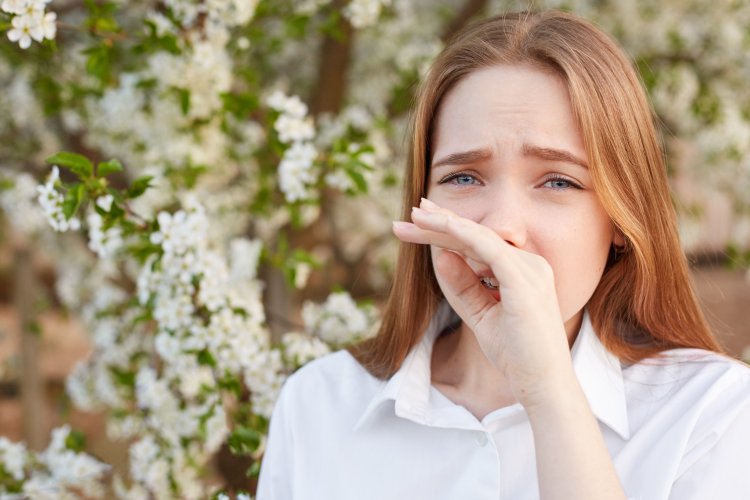Nature's Challenge: How to Live with Pollen Allergies
Pollen allergies, also known as hay fever or allergic rhinitis, are widespread allergic reactions triggered by the pollen from various plants, including trees, grasses, and weeds. This comprehensive guide covers the essential aspects of pollen allergies, including their causes, symptoms, diagnosis, treatment options, and preventive measures.

What Are Pollen Allergies?
Pollen allergies occur when the immune system mistakenly identifies pollen as a harmful substance and overreacts to it. Pollen grains, which are tiny particles released by plants for fertilization, can be carried by the wind and inhaled, leading to allergic reactions in sensitive individuals. These reactions are typically seasonal, aligning with the pollen production cycles of different plants.
Symptoms of Pollen Allergies
Symptoms of pollen allergies can range from mild to severe and often include:
- Sneezing: Frequent and uncontrollable sneezing.
- Runny or Stuffy Nose: Clear nasal discharge or nasal congestion.
- Itchy or Watery Eyes: Red, itchy, and teary eyes.
- Itchy Throat or Ears: Persistent itching in the throat and ears.
- Coughing: Irritation leading to a dry cough.
- Postnasal Drip: Mucus dripping down the throat from the nose.
- Fatigue: Feeling tired or sluggish, often due to disturbed sleep.
- Asthma Symptoms: Wheezing, shortness of breath, and chest tightness, particularly in those with asthma.
These symptoms can significantly impact daily life, causing discomfort and reducing productivity.
Causes of Pollen Allergies
The primary cause of pollen allergies is the immune system's hypersensitive response to pollen. Several factors contribute to the development of pollen allergies:
- Genetics: A family history of allergies increases the likelihood of developing pollen allergies.
- Environmental Exposure: High exposure to pollen, especially during peak seasons, can trigger allergic reactions.
- Climate and Weather: Warm, windy, and dry weather conditions facilitate the spread of pollen.
- Pollination Seasons: Different plants release pollen at various times of the year, leading to seasonal allergies. Common allergenic pollens include:
- Tree Pollen: Oak, birch, cedar, and pine, typically in spring.
- Grass Pollen: Bermuda, Timothy, and Kentucky bluegrass, often in late spring and summer.
- Weed Pollen: Ragweed, sagebrush, and pigweed, usually in late summer and fall.
How Are Pollen Allergies Diagnosed?
Diagnosing pollen allergies involves a combination of medical history review, physical examination, and specific tests to identify allergens:
- Medical History: The doctor reviews the patient's history of symptoms, their duration, and any patterns related to seasonal changes.
- Physical Examination: A thorough examination to identify signs of allergic reactions, such as nasal congestion and red, watery eyes.
- Allergy Tests:
- Skin Prick Test: Small amounts of common allergens, including pollen, are introduced into the skin using tiny needles. If a raised bump (wheal) appears, it indicates an allergic reaction.
- Blood Tests: Tests like the RAST (radioallergosorbent test) or ImmunoCAP measure specific IgE antibodies in the blood to identify sensitivities to different pollens.
Treatment of Pollen Allergies
While there is no cure for pollen allergies, various treatments can manage and alleviate symptoms:
- Avoidance: Reducing exposure to pollen by:
- Staying indoors during high pollen counts, particularly in the early morning and on windy days.
- Using air conditioning with a clean filter to keep indoor air pollen-free.
- Keeping windows and doors closed during pollen season.
- Using HEPA filters in air purifiers to remove pollen from indoor air.
- Medications: Several over-the-counter and prescription medications can relieve symptoms:
- Antihistamines: Such as cetirizine, loratadine, and fexofenadine, reduce sneezing, itching, and runny nose.
- Decongestants: Like pseudoephedrine and phenylephrine, relieve nasal congestion.
- Nasal Corticosteroids: Such as fluticasone and budesonide, reduce inflammation in the nasal passages.
- Leukotriene Receptor Antagonists: Such as montelukast, block the action of chemicals involved in allergic reactions.
- Immunotherapy: Allergy shots (subcutaneous immunotherapy) or sublingual tablets (placed under the tongue) gradually desensitize the immune system to specific allergens. This treatment is typically considered for severe allergies or when other treatments are ineffective.
Preventive Measures and Tips
To effectively manage and prevent pollen allergies, consider these practical tips:
- Monitor Pollen Counts: Stay updated on daily pollen levels through weather reports or specialized apps.
- Limit Outdoor Activities: Reduce time spent outdoors during peak pollen times, especially in the early morning and on windy days.
- Shower and Change Clothes: After being outside, shower to remove pollen from your skin and hair and change clothes to avoid bringing pollen indoors.
- Keep Indoor Air Clean: Use air conditioning and HEPA filters to reduce indoor pollen levels. Regularly clean floors with a vacuum equipped with a HEPA filter.
- Consult a Specialist: If symptoms are severe or persistent, consult an allergist for personalized advice and treatment plans. They can provide tailored recommendations based on your specific allergy profile.
In conclusion, pollen allergies are a common but manageable condition. By understanding the causes, recognizing the symptoms, seeking proper diagnosis, and adhering to effective treatment and preventive measures, individuals can significantly reduce the impact of pollen allergies on their daily lives. If you suspect you have pollen allergies, consult with a healthcare provider to develop an appropriate management plan tailored to your needs.
Disclaimer:
The information provided in this article is for educational purposes only and should not be considered medical advice. If you have any health concerns or are experiencing symptoms, it is important to consult with a healthcare professional, such as a doctor or clinic, for proper diagnosis and treatment. Always seek the advice of your doctor or other qualified health provider with any questions you may have regarding a medical condition. Do not disregard professional medical advice or delay in seeking it because of something you have read in this article.
Hashtags:
#PollenAllergies #AllergySeason #HealthTips #ManageSymptoms #ConsultYourDoctor
What's Your Reaction?





















